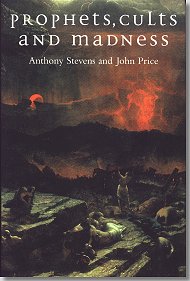|
|
| PROPHETS,
CULTS AND MADNESS (2000) |
|
| by Anthony
Stevens, written in collaboration with John Price |
|
|
|
"The most common of all follies is to believe passionately in
the palpably not true. It is the chief occupation of
mankind." H.L. Mencken.
"Wide is the gate and broad is the way that leadeth to
destruction,
and many there be that go in thereat." Matthew, 7:13. |
|
|
|
|
| Publishers |
|
| Published by Duckworth, London |
|
|
|
| Publishers
Description |
|
Cult leaders inspire intense
loyalty among their followers, yet they strike outsiders as half
mad. Why are there so many of them? And why do they and their
crazy ideas proliferate? In this controversial study of the thin
divide that separates cult leaders from madness, evolutionary
psychiatrists Anthony Stevens and John Price argue that what
schizophrenics and prophets share in addition to similar genes is
the capacity for sudden, radical changes of belief. Depending
on the circumstances, this capacity may propel one group into
psychiatric care and another into the creation of a new cult.
Citing examples from Abraham and Moses to Shoko Asahara and David
Koresh, Stevens and Price reveal the vital role that such
schizoptypal prophets play when human groups split. Inspiring
their followers with new hope, new beliefs and the prospect of
entering a Promised Land, they forge a strong bond between members
of the new group. At the same time, the sexual exploitation cult
leaders are known for ensures the abundant propagation of their
schizotypal genes. Stevens and Price brilliantly show that here
lies a solution to one of psychiatry's persistent mysteries: low
fertility ought long ago to have led to the decline and extinction
of schizophrenia. In the behaviour of cult leaders the authors
argue we can see an important evolutionary mechanism.
Reviews
"Stevens and Price have produced an elegantly written and
witty compilation of fascinating anecdotes and psychobiographies
of major cult leaders ranging from Jesus to Hitler, Jim Jones,
Bagwan, David Koresh and Charles Manson. They also proffer a treasure
trove of evidence from anthropology and ethnography. Particularly
fascinating are the references to archetypal themes of birth and
death, the struggle between light and dark, creation and
destruction and the search for the Promised Land. Stevens and
Price view Jung as the first evolutionary psychiatrist and attempt
to forge a synthesis between analytical psychology and
evolutionary psychology. Stevens states that archetypes might be
inwired algorithms. We have all inherited an algorithm for
indoctrinability as only the credulous child can be taught. They
also wander off into thinking about genocide and national
characteristics; the Germans and their search for Lebensraum, the
English building empires and the Americans going west. This book
is recommended even if the reader remains dubious about what might
be mere speculation as schizophrenia could turn out to be a
degenerative organic disease like Huntington's Chorea and
Altzheimer's."
Marcia Rytovaara, The Journal of Analytical Psychology.
"The most alarming undertow in this study of latter-day
prophets is that the ruthless sexual exploitation of female cult
members by cult leaders such as David Koresh was necessary to
ensure the propagation of their schizophrenic genes. Stevens and
Price shift the blame for religious fanaticism from God to the
very human condition of schizophrenia. In the context of
evolutionary biology, they argue a convincing case bolstered by
the recent discoveries of evolutionary psychiatry and evolutionary
psychology."
Iain Finlayson, The Times.
"This book is stimulating, imaginative, enlightening and shocking. I commend the authors for their bravery."
Chris Cantor, ASCAP |
Availability
Available throughout the world.
Order this book online


|
|

|
|
|
|
|